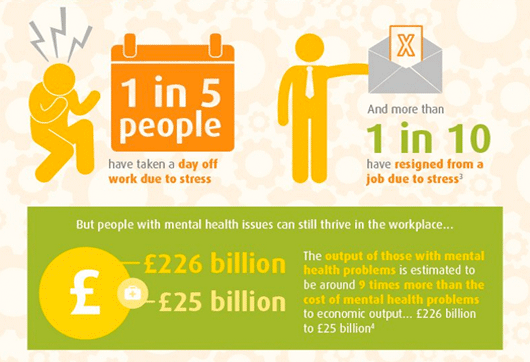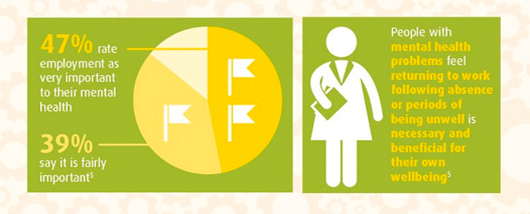We all have mental health – it goes up and down a sliding scale depending on different influences at different times. Sometimes it becomes overwhelming and a mental health problem starts to affect ability to perform at work. How can an organisation deal with it sensitively and practically? Are anxiety and depression taboo or is it best to talk? In light of Mental Health Awareness Week, we would like to share our recent experience of supporting employees’ mental health at Churchill Hui.
Just over a year ago, our Administration Assistant Rita was not in a good place. “Depression and anxiety are conditions I’ve lived with for a long time, but I’d nearly always ignored them, thinking I was a failure at life rather than actually ill. During the first part of 2017, things gradually got worse and worse until I was unable to function properly. Things took a turn for the worse in January 2018 when, combined with extreme circumstances within my family, I had a breakdown and was suicidal.”
Fortunately, Rita turned to people she could trust for help. Although it can feel like the only solution is to run away from it all, talking to your employer or manager about mental health is a commendable first step. Rita was worried that she would not be able to manage financially if she took time off, but the ultimate worry was losing her job: “as I already had anxiety, these worries actually made speaking out harder”. Director Claire Crook who assumes the role of HR for Churchill Hui had noticed changes in Rita just before she approached her for help and they arranged an informal chat away from the office. As Claire explains, there’s no need to make a mental health discussion overly formal, intimidating or involving people who don’t know the employee.
Smart employers support employees who are experiencing mental health problems to cope and recover. The support people receive from employers is key in determining how well and how quickly they are able to get back to peak performance. Mind

Source: UNUM: Are you looking after your staff’s mental health?
Churchill Hui gave Rita time off from work and reassurance that her job was not in danger, so she could start medical treatment including care in a psychiatric unit to kick start her recovery. “Our priority was to find a solution to retain her talent and keep her in the workplace, by looking at the business’ bigger picture and how a restructure could work for all” says Claire. “We are grateful to the whole of the Churchill Hui team who covered extra initial workload and it was also an opportunity to share thoughts amongst the team about mental health, explain some of the misconceptions and show that the door is always open to employees who feel they might be suffering from anxiety, stress or depression”. According to mental health charity Mind, 1 in 6 workers in the UK is dealing with a mental health problem – it’s a fact of modern life and can’t be ignored. Rita felt relieved once she had taken the first daunting step of talking to her manager. “A plan was put in place straight away to facilitate my return to work and at no point was resigning even mentioned – rather what help was available.”
Standing by people when they experience a mental health problem is not only about keeping hold of a valuable staff member – it also sends a message about your organisation’s values. Mind
Claire and Rita agreed dates for a phased return to work plan after Rita’s initial break for treatment. Both had ideas and input along with the rest of the team working with Rita, as it’s important to create an optimum solution for everyone in the organisation. The proposed plan was also backed by Rita’s medical team. It’s not always easy for a small- or medium-sized business to make structural changes but the important thing is to explore all options. Even small adjustments like a staggered lunch break, regular feedback meetings, moving to a different part of the office and time off for medical appointments can help hugely. Rita was offered a new part-time role with fewer office days and different responsibilities which was ideal for her work/life balance (taking care of her family and herself), commute and mental health. It was a sustainable solution for both parties.
Colleagues are often unsure if it’s ok to ask how people are but, just as with a physical health problem, most people appreciate being asked how they’re doing. Mind
Rita and Claire now meet regularly to review how the new role is going, if any adjustments need to be made and how Rita is feeling about work and life. As mentioned, talking is key to avoid build up of negative thoughts or worries that can escalate. When an employee returns to work it’s important that co-workers know it’s ok to ask how they are doing, as they would with someone who has suffered a physical injury.

Source: UNUM: Are you looking after your staff’s mental health?
There is no textbook answer for coping with mental health in the workplace, as everyone is different. But there is a good deal of advice out there from charities like Mind, the Samaritans and helpful HR sources like the CIPD. The good news is that mental health isn’t necessarily a permanent situation when the right measures are taken. Listen, talk, support, know your staff and have an open door policy on mental health.
Six months on, Rita is in a much better place physically and mentally. She still finds it “super hard” to get motivated on some days but going to work is a great benefit for her physical and mental wellbeing, especially the notion of productivity it evokes. The role is working out well for Churchill Hui too – in fact we are expanding the team.
“I am on medication and, along with lifestyle changes, I am finding life much easier to deal with. I’m eating well, losing weight, taking up regular exercise again and have given up smoking. I am extremely grateful that my employer has supported me so much. Knowing that I am valued means it’s easier for me to be able to say “I’m not doing so great right now” and know it will be taken seriously. Though hopefully I won’t need to say it again!”
We wish Rita a continued positive mental health journey.
Thank you to Rita and Claire for sharing their stories.
